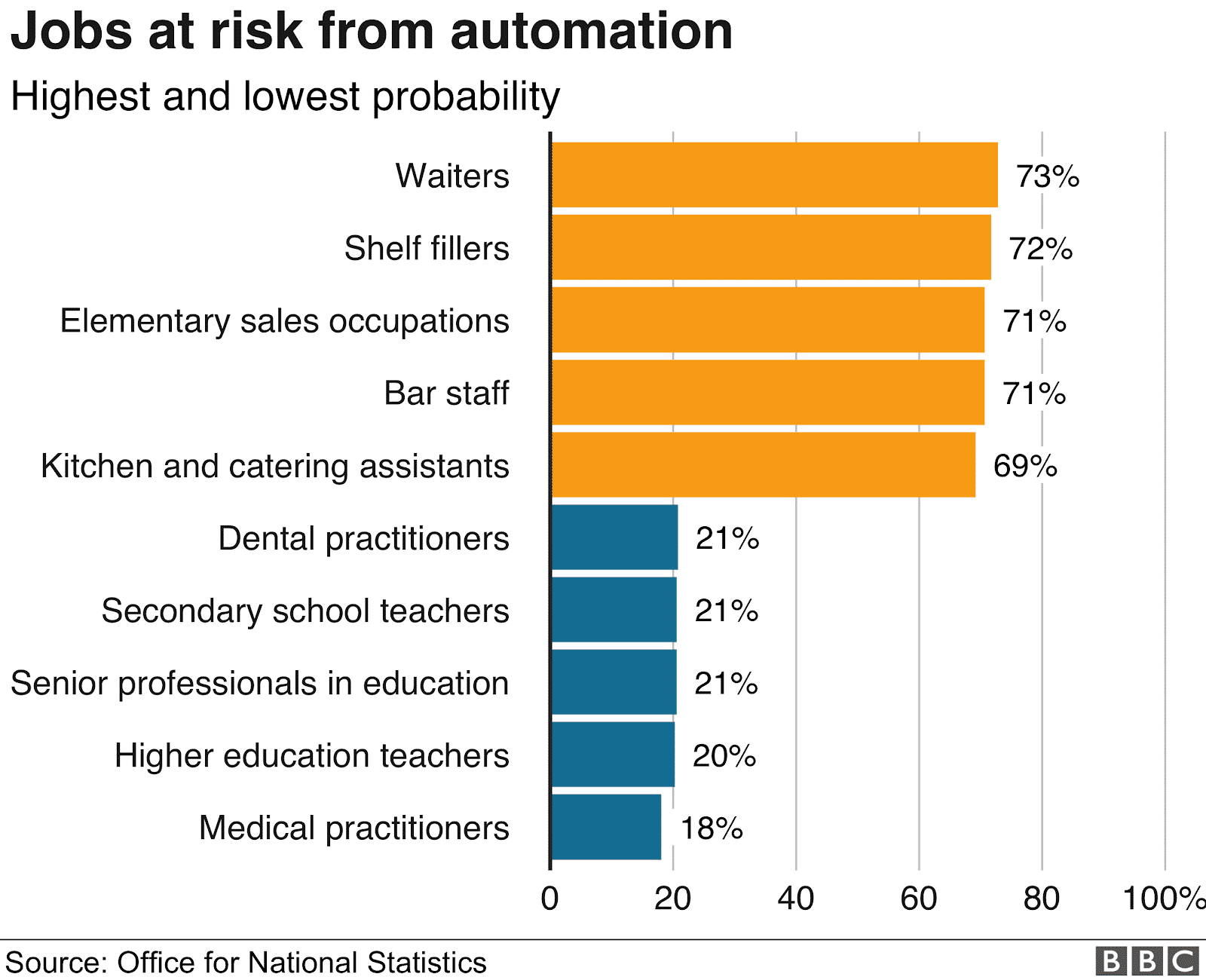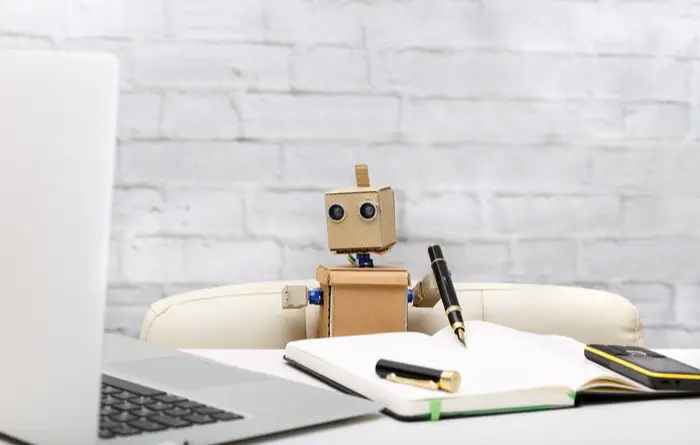AI stands for artificial intelligence. AI systems will typically demonstrate at least some behaviors associated with human intelligence such as;
- Planning
- Reasoning
- Problem solving
- Knowledge representation
- Perception
- Motion
- Manipulation
- Social intelligence and creativity
It’s estimated that 1.5 million people in England are at risk of losing their jobs due to artificial intelligence and automation.
The office of National statistics says that 70% of roles that are at high risk, are currently held by women.

The Graph above supports the recent report by ONS which showed that employees in the food industry will be hit the hardest. After that, it could be workers in retail and then after that, teachers and medical practitioners.
There’s the question as to whether E-learning will take teachers jobs. Online courses are becoming important in many countries as they allows students to gain access to a greater depth of information than a teacher may be able to provide.
Robots and AI have started to worm their way into the retail industry. The majority of supermarkets now offer self service and more recently, departments and clothing stores now do.
Retail giant, Zara now offers self checkouts in some of their stores where you can buy or return items. Who needs a cashier anyway? In some HSBC banks, customers are greeted by a robot who questions why you might be there and if he can do anything to help. However, although this might seem that the robot has taken someone’s job, HSBC says that the reason behind it is so that it frees up bankers and specialised employees.
A survey by Pew Research Internet finds Americans are roughly twice as likely to express worry (72%) than enthusiasm (33%) about a future in which robots and computers are capable of doing many jobs that are currently done by humans. A survey was conducted where it showed that 46 countries and 800 working environments found that number of people forced out of jobs by machines could near the one billion mark by 2030.
It’s argued that jobs may be shredded, but not eliminated. Rather than worrying about jobs, bosses, employees and company, owners should introduce AI into the workplace rather than it be a threat.
The overall threat of AI is that it won’t only take away jobs but change what workers do. An example is before airlines and aeroplanes were created, we never would have dreamed of having a job as an air hostess. Or, before Apple was created, who knew what a tech genius was? So, despite forcing tens of millions out of jobs in the next four years, the WEF thinks near twice as many more job opportunities will be created.
Technology has affected our life both positively and negatively. New technology takes our lives to a different level. It might ruin jobs but we can’t forget about the jobs that are created due to technology.
A.I assisted health care technician is where doctors will need the same health care skills but also up to date technology to deliver them remotely, but using telemedicine tools and in-home testing equipment. Thanks to A.I nurses will also be able to diagnose and treat more ailments, leaving doctors to support these technicians and handle the trickier cases directly.
For example, if the health care sector hires a doctor to answer appointed Facetime calls people are more likely to seek medical advice if they have access to Facetime. This is because the citizens who work 9-5 may not have a chance to go see a GP but if they’re on their lunch break they will not need to leave work or take it off sick.
We have all tried Uber at least once, just from a little persuasion of ‘sign up now and receive £10 off’. Uber is classed as technology, rather than a taxi because it becomes safer and easier for users. This technology has created over two million jobs worldwide. Although, we had taxi drivers ten years ago and a lot of them will have changed jobs, Uber has created delivery services for companies such as Mcdonald’s with Uber Eats. All through an app, thanks to technology we now could not imagine life without them.
Social media has several roles which have been formed – ten years ago most people didn’t even know what social media was and now in the 21st century we couldn’t even cope with Facebook being down for 24 hours.
Social media platforms have been growing and developing ever since Facebook came out, it has become a key method in reaching a wide audience, as has Twitter, Instagram, and Snapchat. Instagram influencers with up to 1 million followers can receive around a six-figure salary.
There are now so many new job roles such as App Developers, YouTube Content Creators, even websites such as Airbnb has formed dramatically due to technology.
One main issue with these new jobs is they appeal to a much younger generation. It tends to be the employee’s losing jobs due to technology are the older generation. When we think back to coal miners, it took up so many jobs that when the demand was no longer needed, in the 70s so many were out of jobs because we had electric fires now.
It’s easy to blame technology for taking jobs but the reality is, we can’t live without it and it will continue to dominate our lives.
For more information on how AI could help your business contact Webanywhere.
Email: info@webanywhere.com
Call: 0113 3200 750

Molly and Katie


